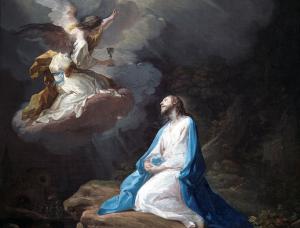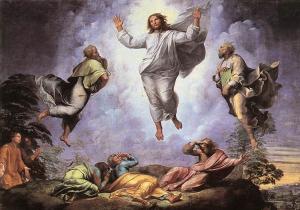 Missing Mystery is also missing in many Catholics’ Faith
Missing Mystery is also missing in many Catholics’ Faith
Ever since my long-ago younger days I’ve thought that there were some mysteries missing from the Rosary. (For previous posts on the mysteries of the Rosary, see here.) There were all the years between Jesus’ childhood (the Joyful Mysteries) and his passion and death (the Sorrowful Mysteries). It seemed that Jesus’ life between these two ends, especially his public ministry, ought to count for something. I would have liked a spot for the Transfiguration, the Eucharist, and a miracle or two. All of those prayers and more were answered when Pope Saint John Paul II added the Luminous Mysteries to our praying of the Rosary. But something important is missing still—the Second Coming of Jesus.
Just how important is that last mystery? We pray for it in the Lord’s Prayer, we proclaim it in the Eucharistic Acclamation, and we say we believe it in the Creed. But my guess is that Jesus’ Second Coming is a mystery that the average Catholic pays not much attention to. My 1960’s Catholic education wasn’t much different. Once I had memorized the “four last things” – death, judgment, heaven, hell – there didn’t seem to be much more to say.
Life after death
Well, for my individual fate those four words do say a lot. And if there’s some part of our faith that gets a lot of attention—and not just from Christians—it’s what happens to us after we die. I was engaged in a conversation on that subject with some Catholics, some former Catholics, some who still believed in God, some who never did, and some, maybe most of us, who weren’t sure. Popular among this group was the idea of reincarnation. It just seemed appropriate that a person who made a mess of this life should get another chance to get it right. And maybe all of us need several lifetimes to evolve toward whatever god might be waiting for us.
I skipped all the theological, philosophical, and scientific problems and just mentioned my belief that Jesus would come again to this world, raise our bodies from their graves (the same bodies we call ours now, only glorified then), and renew the earth and the cosmos. God’s Kingdom would arrive “on earth as it is in heaven,” and God’s rule would be complete. It’s the climax of creation, of salvation history, of the Bible’s last book (“Amen. Come, Lord Jesus!”), and of our faith. Yet it came as a surprise to this group.
The surprise, I think, consists in the shock value of bodies, material things, having some ultimate value. Value is not what our materialistic lifestyle is about, but instead quantity and hurrying on to the next material thing. Meanwhile, we dabble in spiritual things. We hunt for ghosts, speculate about souls, and fantasize about evolving into god or pure spirits or information patterns that can survive the scientifically inevitable cold death of the universe.
What can bodies do in “heaven”?
I gather that for most Catholics “up there” is only a metaphor for wherever heaven might be. Still it’s a metaphor that misleads. Whatever heaven is, the metaphor seems to say that its whereabouts is somewhere else, not here. So a friend once told me—I don’t think she believed it literally—that in heaven she would like the job of polishing the stars. Hoping to bring the conversation down to earth, I said I would apply for the job of changing the Holy Innocents’ diapers. To each her or his own in heaven.
In our different ways she and I were saying that whatever excitement, joy, or fulfillment there is in heaven, it can’t be apart from bodies and the things bodies do. Even to sing God’s praise with the angels we have to have our bodies. More theologically: God loves (calls good) all of God’s works and will not abandon in eternity any part of this good creation. Jesus is coming back to this universe to stay.
The Church teaches that the essential joy of heaven is to be face to face with God. I know of no teaching about how that will work, but I suspect that everything good that God ever made, along with the humanity of Jesus, will be an inexhaustible supply of mediators of God’s presence. I was taught in a class of Catholic philosophy that even in heaven we finite creatures won’t know God directly but always mediated by some created thing. I’m not able to judge that one way or the other. I do believe that, with so much stuff, so many “thin places” around, everyone’s experience of God will be different. There will be lots to talk about.
Putting the Second Coming into the Rosary
The point of this post is that Catholics need more occasions to think about Jesus’ Second Coming. The Rosary could be one such time. The Season of Advent is another. If only people understood that the advent in question isn’t Jesus’ coming as a baby or Jesus’ knocking on the doors of our hearts. It’s the coming of Jesus in triumph at the end of this age of the world for which we wait.
John Paul II already made a major change in the way we say the Rosary. I would like to see a much smaller change. Some might find any change disturbing, so it should be as small a change as possible. Best if it doesn’t leave out anyone’s beloved mystery. The Second Coming would belong among the Glorious Mysteries of the Rosary. Fittingly, it would be the last mystery. So the question is, What to do with the current Fifth Glorious Mystery, the Coronation of Mary, Queen of Heaven?
In Church teaching and dogma, the Second Coming outranks the Coronation. But there’s no need to eliminate the Coronation from the Rosary. We could pray the current fourth and fifth mysteries together, like this:
The Fourth Glorious Mystery, Mary’s Bodily Assumption and Coronation as Queen of Heaven.
Then the last mystery of the Rosary could read:
Jesus’ Second Coming to Establish the Kingdom of God on the Earth.
And why not tack on the prayer that ends the Bible: Amen. Come, Lord Jesus!
Praying for the Second Coming
The first followers of Jesus prayed for his coming again and expected it to happen any time. After so much time has passed and Jesus hasn’t shown up yet, that is a hard prayer to make and mean it. But it’s not just the amount of time.
I think of the years remaining in my life and the things I hope to do before that end. There are new places I want to see, new experiences to savor. I haven’t enjoyed my grandchildren enough yet; I want to see them grown, making their way in the world, and passing on the family values or some new ones. I imagine I still have some accomplishments of my own with which to grace the world. There is more that I want to write. My legacy is not ready yet.
I don’t think of Jesus’ first followers thought that way. And why should I imagine that Jesus is waiting for me to become a finished product? Or for the world to solve global warming, poverty, abortion, pandemics, and racism—all things about which I pray fervently? So I also pray – half-heartedly and distracted by the thought of the traces, for good or ill, that I leave on this world; but still I pray—for Jesus to come. (Soon! Whatever that means.)
My hopes are for this world, especially the future world of my grandchildren; and Jesus anchors these hopes. Without Jesus hope is only calculating odds, which don’t look so good at the moment. With Jesus hope is real, even if I can’t explain it. With Jesus deep trust seems right. Or, perhaps, with a deep trust that I can’t explain but still keeps me moving, Jesus seems right.
I don’t really expect Jesus to come any day now, but … “soon.”
Image credit: Dreamstime












